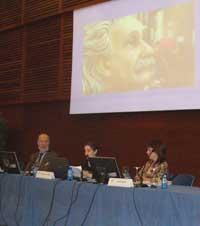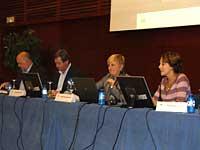Scientific journalism in the Kursaal of San Sebastián

María Pilar Perla (in the center) spoke of the Third Millennium supplement of the newspaper Heraldo de Aragón.
At the beginning of the day, the coordinator of the Elhuyar Laboratory, Bego Zubia, presented a written press study. The group Zubiaren collected and analyzed for four months the scientific topics published in the newspapers published in the Basque Country and made a summary of the main results to start the day.
Media on the table
Later the journalist María Pilar Perla intervened. He is responsible for the Third Millennium supplement of the newspaper Heraldo de Aragón. This is a supplement on science that took place yesterday since its first publication. Perla presented the main line of the supplement. As he only does, thanks to a large network of researchers and disseminators, the scientist has a great experience in writing the dissemination. He spoke about it. In addition, he contributed ideas to make an attractive weekly supplement.
The morning day ended with a round table. The table was attended by Arantzazu Zugasti, deputy News Director of Gipuzkoa, Juan Beloki, responsible for the radios of the group EITB and Bingen Zupiria, director of ETB. Its objective was to analyze the treatment of scientific news from the points of view of the written press, radio and television, respectively. Among other things, Zugasti spoke of the problems they have when evaluating the news. Beloki was worried about the news, because the radio needs stories, and Zupiria made it clear that the path of specialized journalists was not a strategy accepted by ETB. The three were in favor of establishing alliances with those who understand science.
The word of observatories

Juan Beloki, EITB Group Radio Manager, Arantzazu Zugasti, Gipuzkoa News Deputy Director, and Bingen Zupiria, ETB Director. Particularly noteworthy were those who consider science as a journalistic difficulty.
In the afternoon spoke Gema Revuelta of the Universitat Pompeu Fabra. He is director of the University's Science Communication Observatory and studied why science is worth communicating. For example, he provided the idea that if scientists do not do it themselves, and are not willing to do so, other fields will be included. For example, if evolution is not explained by a scientist, a creationist will occupy that place. In addition, he presented resources to analyze the relationship between science and society, and how this concept has changed.
Later it was the turn of the Autonomous University of Barcelona, María Teresa Escala. Scales Observatory of scientific diffusion is the director of the observatory and spoke, among other things, of the influence of scientific policies.
The afternoon session closed a second round table. There met Luis Alfonso Gámez, scientific journalist of the newspaper El Correo, Jesús Ugalde, researcher of the UPV, Txema Ramírez de la Piscina, professor of journalism of the UPV and previously spoke Gema Revuelta. They discussed the need to communicate the uncertainty behind scientific research and the scientific method.
Interesting day to reflect on scientific journalism.
Buletina
Bidali zure helbide elektronikoa eta jaso asteroko buletina zure sarrera-ontzian











